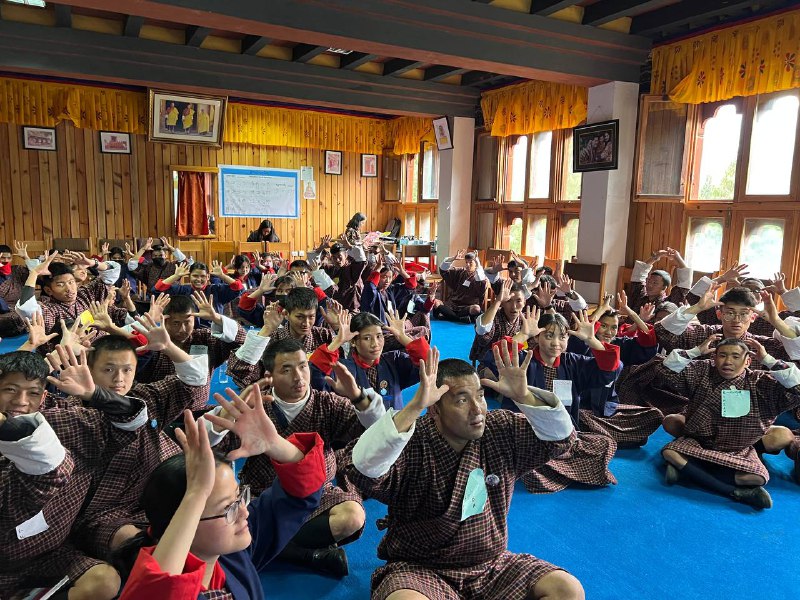In the serene valleys of Paro, Bhutan, where traditional craftsmanship meets modern aspirations, a young man named Lhakpo has carved out more than just wooden artifacts, but he has carved out a future for himself and his fellow deaf graduates.
At 24, Lhakpo represents a new generation of skilled artisans at the Wangsel Institute for the Deaf. But his journey to becoming a successful woodcarver and entrepreneur wasn’t without its challenges. Like many deaf graduates before him, Lhakpo faced a harsh reality: having skills but nowhere to apply them meaningfully.
The Challenge of Being Skilled but Unemployed
Before the establishment of the Incubation Centre, life looked quite different for deaf graduates from Wangsel Institute. “Before the establishment of the Incubation Centre, we, the deaf graduates, faced many challenges such as the lack of job opportunities, even though we had good skills,” Lhakpo explains.
The situation was particularly frustrating for graduates even though they have good skills and talents. Despite their technical abilities, many found themselves in unsuitable employment situations. For example, some graduates start to work in restaurants or do dishes.
This gap between skill and opportunity was more than just an employment issue, it was a barrier to independence and dignity for an entire community of talented individuals.
A Turning Point: The Incubation Centre

The transformation began when Wangsel Institute’s leadership recognised the challenges their graduates faced and sought solutions through partnership.
“Our principal and teachers took the initiative to address the challenges faced by deaf graduates. Together, they collaborated with READ Bhutan and ASB South and South-East Asia to establish an incubation centre” Lhakpo explains. ASB South and South-East Asia have collaborated with READ Bhutan under the project ‘Increased Resilience of Communities in Nepal and Bhutan Through Improved Risk Management and Inclusive Socio-Economic Development’ is supported the construction of the incubation centre and showroom, and also provided the necessary machinery.
For Lhakpo, this development represented hope for a different future. “I expected to become independent in my life. I also hoped to learn new things through this centre, and I aspired to get employed through it.”
“I participated in the entrepreneurship programs and was part of the woodcarving group that the project provided. The project provided tools and machinery too.” Lhakpo shares. The experience was collaborative and educational. “We learnt about financial literacy and entrepreneurship, while connecting with our peers during the programs.”
Working alongside others created a supportive community. “I do wood carving works with the other students from Wangsel Institute for the Deaf in Paro” he notes about his current work environment.
The Impact: From Dreams to Reality
The transformation in Lhakpo’s life has been significant. What once seemed impossible earning a sustainable living from his craft has become his reality. “With enhanced tools provided by the project, our skills improved. We started getting work and earning money with the skills we learnt, finally being able to financially support ourselves and our families” Lhakpo explains.
The financial impact is tangible. Lhakpo began earning an average monthly income of Nu. 17,000 ($191,607) after joining the Incubation Center. This success is part of a broader transformation, with graduates working through the Incubation Center collectively earning an average of Nu. 300,000 ($3.381,3) to date, and voluntarily contributing 15% of their income to support the center’s sustainability.
Beyond financial gains, the change has been deeply personal. “We got to upgrade our skills. We started earning for ourselves. We are motivated to work because we have a space where we can learn, showcase our work, and we feel acknowledged by the people we work with.”
When asked about challenges during the project, Lhakpo’s response was simple: “We didn’t face any challenges.” Today, Lhakpo is among the first seven graduates from the Wangsel Institute successfully earning a livelihood from their training. His success represents more than individual achievement. It’s proof that with the right support, barriers can be overcome.
Looking to the future, Lhakpo and his colleagues have broader aspirations. “We wanted to get employed and work with a larger community of hearing people” he shares, indicating their desire to expand beyond their current environment.
Woodcarving a Future of Hope
Lhakpo felt grateful for the Incubation Centre, as it spared him from returning to his village with no source of livelihood—a reality that many others often face.
His journey from a skilled graduate with limited opportunities to a successful entrepreneur demonstrates the transformative power of inclusive development programs. The Incubation Centre has provided not just tools and space, but dignity and purpose to deaf graduates who previously had few options for meaningful employment.
As Lhakpo continues his work at the Incubation Centre, creating and selling his woodcarving products, he represents hope for countless other skilled individuals who simply need the right platform to showcase their talents and build sustainable livelihoods.

